Advanced Run Job Webhook (Commercial)
Advanced Run Job Webhook (Commercial)
Available in PagerDuty Runbook Automation Commercial products.
The powerful Enterprise Advanced Run Job webhook handler enables selective execution of one or more jobs based by evaluating event data.
Each event passes through one or more routing actions. If the event satisfies the action conditions the target job will be executed with the supplied job options. Conditions and job options can be constructed from event data!
General Settings
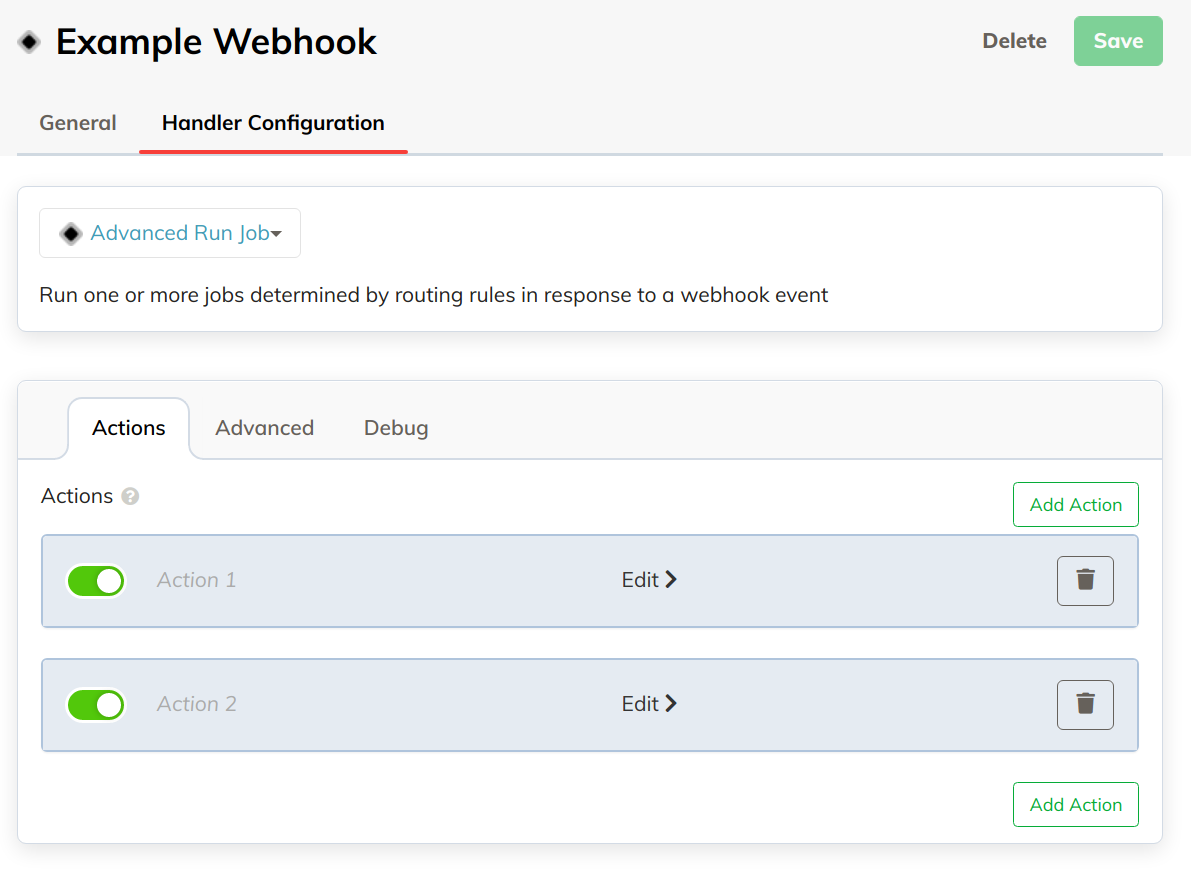
Batch Key (optional)
The batch key makes it possible to extract a list from the event and run each item through the action processing.
Given:
{
"messages": [
{"msg": "foo"},
{"msg": "bar"}
]
}
The batch key $.messages could be used to process each item individually.
Note: Enabling Batch Key executes all items concurrently. Therefore, the job associated with the Webhook must have Multiple Executions enabled and a value large enough to support the number of items extracted from the list.
Tips
The batch key supports JsonPath deep scanning. A key such as $.messages[*].alerts could be used to extract nested lists and process the items individually. Lists are recursively flattened.
Event ID Key (optional)
The event ID key can be used to replace the ID auto generated when webhook events are received. This will be reflected in the logs. Batches are extracted before applying the event ID key to each item.
Actions
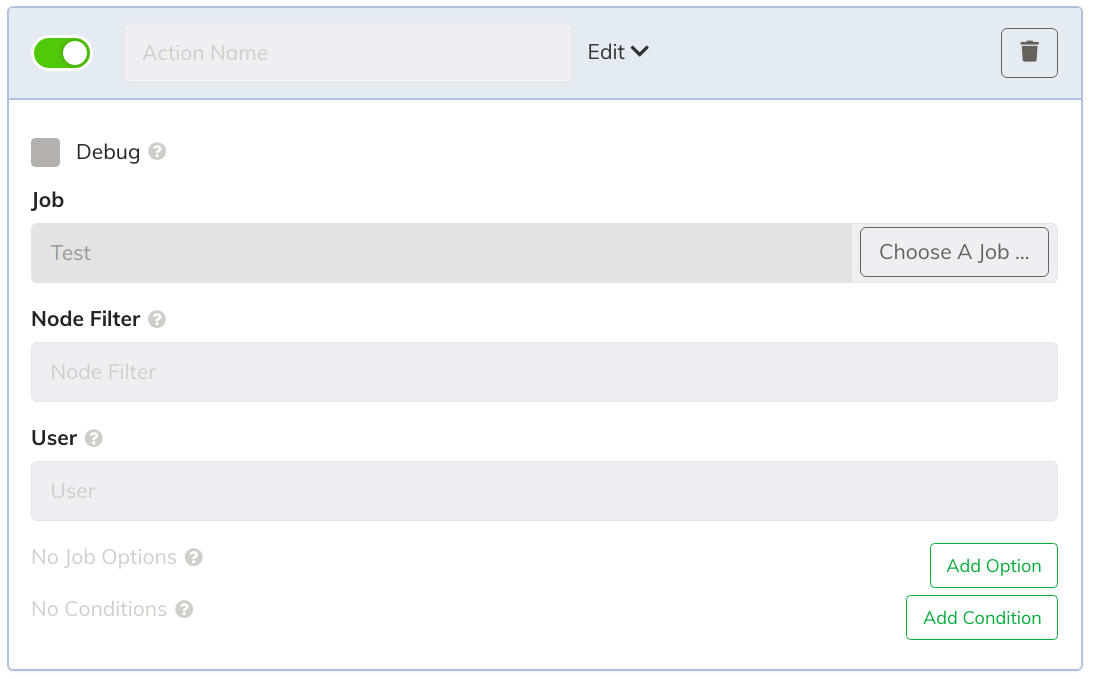
Tips
Actions can be individually enabled/disabled!
Each webhook event gets evaluated against each action. If the action satisfies the conditions the target job will be executed.
Name (optional)
A label to identify the action.
Debug
Action evaluation debug info can be printed to the INFO log level by selecting the debug option. This can make it easier to troubleshoot actions while reducing noise.
Job
Use the job picker to select a job target. If the action evaluation is a match the target job will be executed with the Job Options.
Node Filter (optional)
Used to override the job node filter. You can use a JsonPath or Template to craft a node filter from the event data.
User (optional)
Optionally override the user the job runs as. This can be crafted from event data just like Node Filter
Job Options
Job options to be supplied during job execution. Use JsonPath or Templates to construct the value from event data.
Conditions
Each action can have multiple Conditions. Based on the Policy, the action will apply when all or any of the conditions are satisfied. Each Condition defines a Field selector using JsonPath, a particular match type (defined below), and a value.

Policy
When more than one Condition is added to the Action, you can select which policy to use for evaluating the Conditions.
- all All conditions must match
- any At least one condition must match
Match Types
equalsSatisfied if the Field equals the value of the provided
valuestring. Note: currently the selected Field will be converted to a String if it is not one, to compare it to the stringvalue.containsSatisfied if the Field is equal to, or contains a substring equal to, the provided
value. For fields whose JsonPath query returns a list of strings, it will be satisfied if the list contains the providedvalue.dateTimeAfter/dateTimeBeforeSatisfied if the Field, parsed as a Zoned DateTime, compares with the provided DateTime.
Warning
Must be a Date with Time.
Supported formats for the Field and the value are:
- ISO_DATE_TIME
- ISO_INSTANT
- Unix EPOCH (assumed to be in milliseconds if year >=2970)
existsSatisfied if the Field is non-null.
Note: A bug exists that this setting still requires a value in the value field. The value is ignored, and bug will be fixed in a future release.
isA- Satisfied if the type of the Field is one of these
values:stringnumbermaplistnull
JsonPath/Templates
Many fields accept a JsonPath or Template string. They will be evaluated as one or the other, based on the following critiera:
- JsonPath: If the string starts with
$, the entire value will be treated as JsonPath. - Template: If the string starts with
\$or if the first character is anything other than$, it will be evaluated as a Template string.
You can use JsonPath to easily access JSON data content on its own, or use the Template mechanism to embed the JSON data within another string.
See below for some examples.
JsonPath
JsonPath allows for very flexible event data extraction.
See Path Examples in the JsonPath repo for easy examples and inspiration.
When using JsonPath, the JSON Webhook event content can be referenced with the basic JsonPath expression of $..
Given this example Webhook event content:
{"foo":"bar"}
The data can be accessed like:
$.foo-> evaluates tobar
Tips
A JsonPath expression that evaluates to a data structure (list or map) will return the data structure as serialized JSON.
Tips
If you want to embed a simple JsonPath expression within a larger string (for example, to add a prefix or suffix), you should use the Template syntax.
Template
Template Strings use the Groovy "GString" expansion syntax, which is designed for embedding variable values into a string.
With in a Template, the JSON Webhook event content can be referenced with the variable name data.
GString Templates use the syntax ${VAR} to expand to the value of the VAR variable, or ${VAR.key} to access map entries or fields within the VAR variable.
Array access can be achieved with ${VAR.some.array[0]}.
Given this example Webhook event content:
{"foo":"bar"}
The data can be accessed in ${data}:The value is ${data.foo} -> The value is bar
JsonPath can also be embedded in the Template string using the ${path('$.foo')} syntax:
The value is ${path('$.foo')} -> The value is bar
Debugging
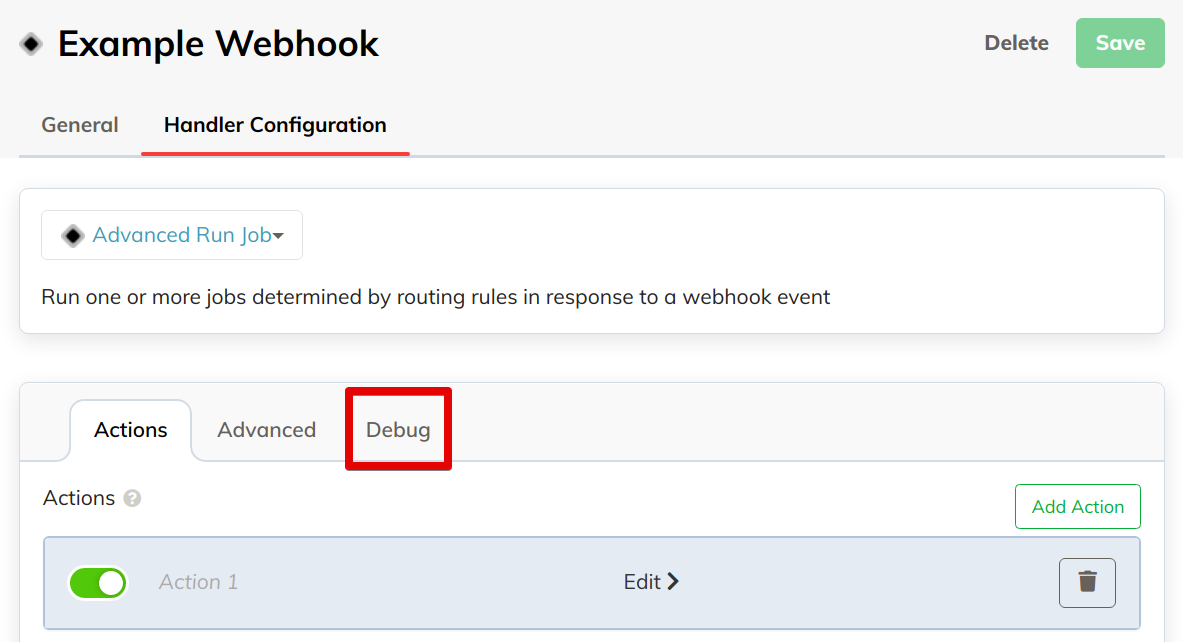
The Advanced Run Job handler(and most Enterprise webhook handlers based in its action engine) provides a debug view into webhook processing. Detailed evaluation results from recently received webhook requests is made available to assist in setup and troubleshooting. This view is accessible by pressing the Debug button at the top of the configuration.
Note
Debug information is historical. The information displayed including the batch key, events, actions, and conditions are as they were when the webhook request was evaluated.
Overview
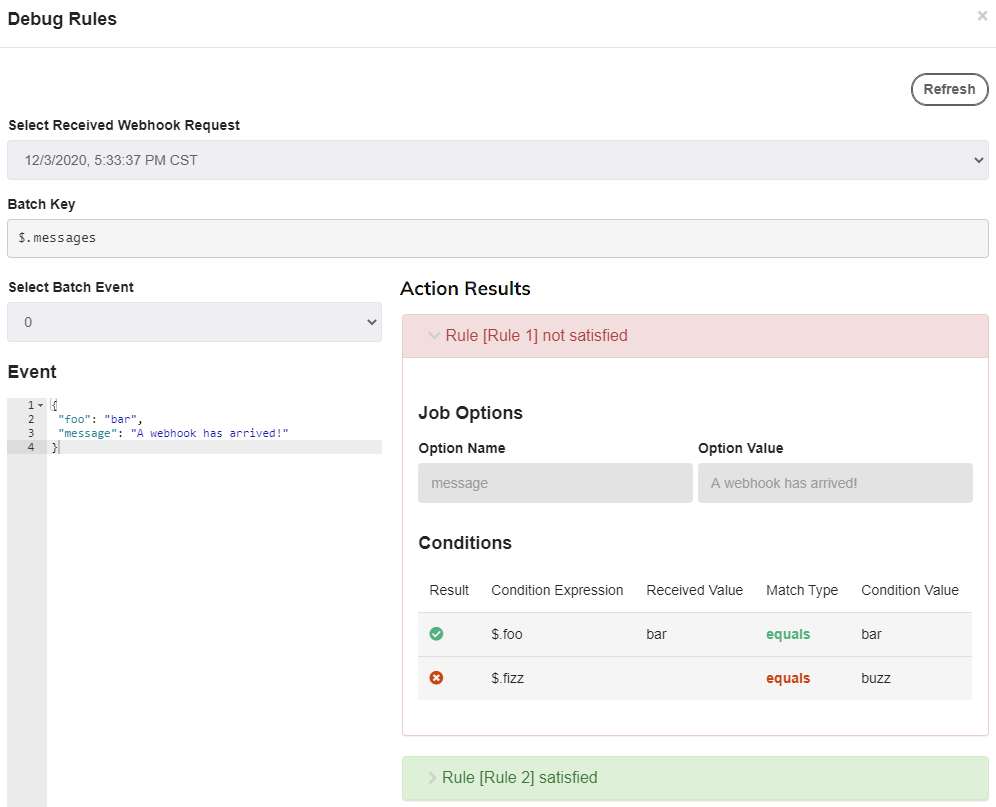
Refresh
Clicking the refresh button will fetch the latest results. The selected result will automatically change to the most recent.
Select Received Webhook Request
The debug view offers a selection of recently received webhook payload requests from the past 24 hours. Each available option is labeled with the timestamp when it was recevied.
Batch Key
This field will display the batch key if configured.
Select Batch Event
If a batch key was specified a sub-select will be available to choose individual extracted events.
Event
The received webhook request payload will be visible in the Event code box. For webhooks with batch keys this will refelct the selected batch event.
Action Results This section will display the action evaluation results for each configured action, for the selected event. It will include the rendered job options, condition results with extracted request data, and the job run status.
Action Results
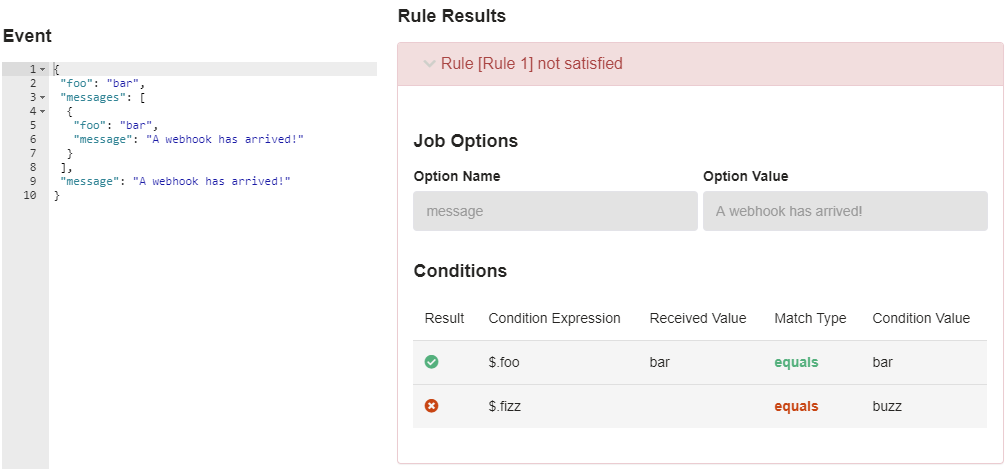
In this sample the action was not satisfied because one of the conditions did not match. The received webhook is missing the property $.fizz which was required to equals buzz.
Job Options
This section displays the configured job options rendered with the received wehook data.
Conditions
A table is rendered summerizing the evaluation results of each condition. The Condition Expression column maps to the configured Event Field and Received Value displays the value extracted from the webhook request.
Errors
Errors encountered processing the webhook or running the job will be displayed in the debug view. Below are a few common errors.
Job Already Running
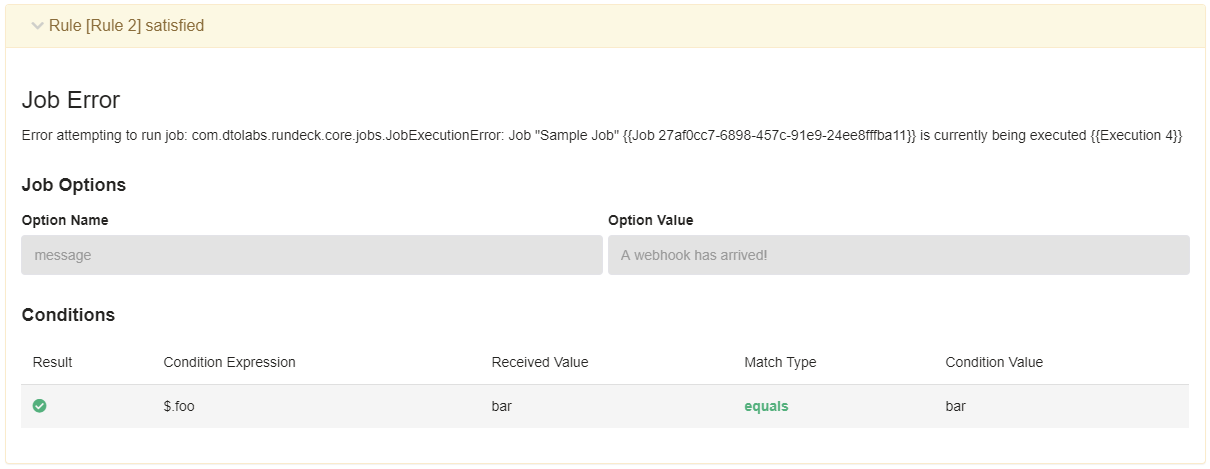
This error is encountered if the job is not configured for parallel execution.
Batch Key Path Missing
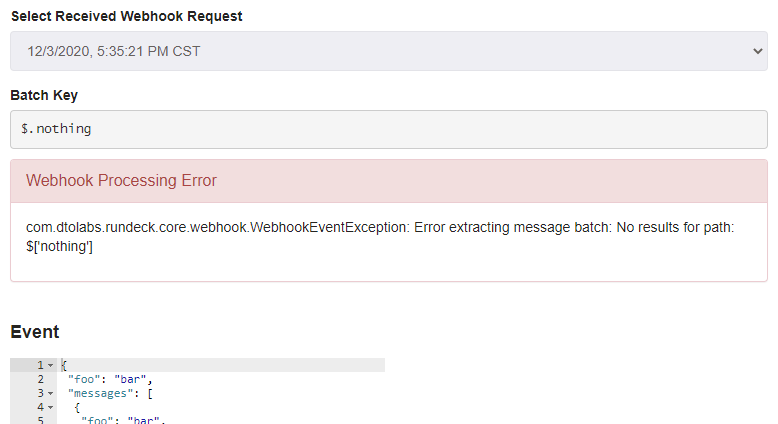
If the the webhook is configured with a batch key, and the path does not exist, this error will appear.
Executions Disabled
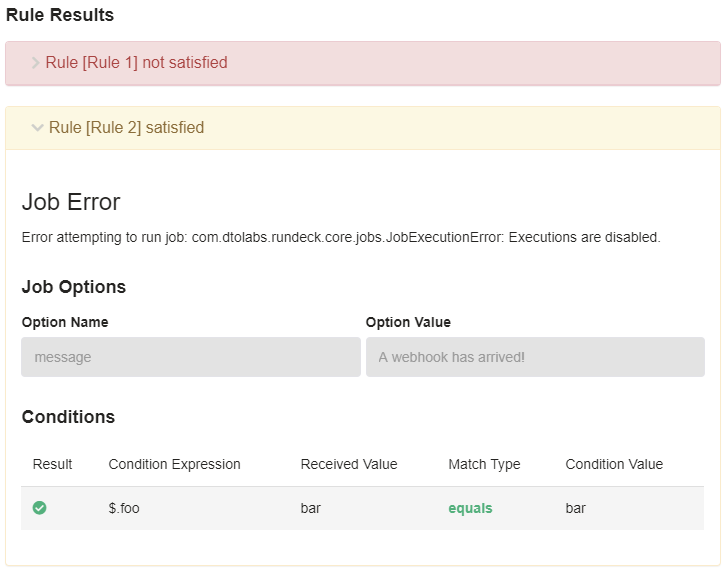
Encountered if the job could not be run due to Rundeck executions being disabled.
FAQ
How do I pass the raw event data to a job?
You can use the JsonPath $ as a job option value to send the event as a serialized JSON. You can also send parts of the event by crafting a JsonPath that returns structured data!
How do I disable the Debugging feature?
You can disable it by adding the following line to the rundeck-config.properties file (requires service restart): rundeck.feature.eventStore.enabled=false It can also be accomplished via the Configuration Management tool in the GUI (Gear Icon > System Configuration), by adding the custom property rundeck.feature.eventStore.enabled with value false. This method does not require system restart.
